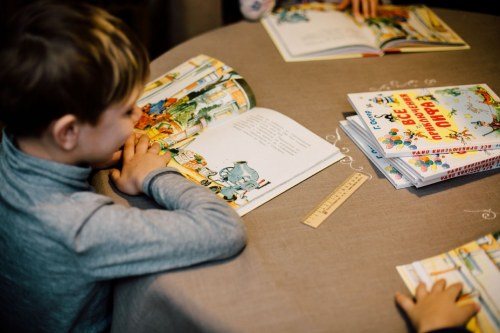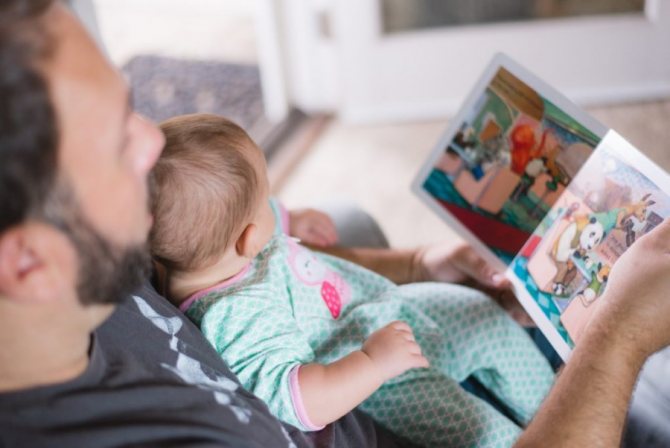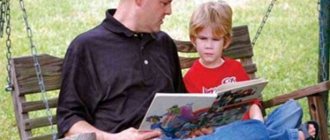Why children don't like to read
Any of our activities can be divided into work and leisure. When a child reads under pressure, it is quite natural that he perceives it as work. Modern parents punish and frighten with books, so the child develops the following theses regarding reading:
- “Reading books is boring.” Many adults know that this is not so, but continue to form the wrong position in the child regarding this type of leisure;
- “All books are not interesting.” When a child gets acquainted only with works from the school curriculum, he begins to believe that all books are like this. Classic literature is important, but it's okay not to like it. Leave it for the school curriculum, offering the child those books that could interest him.
- “Reading is a way to punish me.” This position of the child is the most difficult to cope with. Don't use reading instead of "angle". This will not help your education and will only discourage you from reading books.
You can't force someone to love books, but you can try to instill in your child a love of reading. So how do you teach a child to love reading? Let's try to figure it out.
How to instill a love of books article (junior group) on the topic
HOW TO INCREASE A LOVE FOR BOOKS
Childhood disease of the 21st century - lost interest in the book. In the age of the Internet, children stop reading and will soon stop altogether. Is it possible to instill a love of reading in a child? It’s possible, child psychologists are sure. But the result will be successful only if the parents do not put pressure, but... themselves set an example. Children who read most often grow up with parents who read. Teaching a child to read and getting him to read are two different tasks. We recommend abandoning the second and focusing on the first. You can, of course, force them to read under pressure - with bribery, persuasion, permission to watch TV for every 10 pages read... But as soon as your child grows up a little, books will be discarded and forgotten as a way of oppression, and your son or daughter will firmly sit in computer chair. Children can and should be read from infancy. Little children love books; for them it is entertainment, interesting stories, beautiful pictures and simply the soothing sound of their mother’s voice. Books for little ones must contain colorful illustrations and short, understandable stories. Nowadays, books for the youngest readers often also serve as toys. They may have ties, appliques and holes into which you can stick your fingers. There is nothing wrong with this, child psychologists are sure: such toy books teach the child that any book is an interesting world filled with adventures. Every age has its own books. Of course, mom and dad would like to quickly move on to interesting and informative books about Pinocchio, Moomins or Pippi Longstocking. They remember and love these stories from their own childhood. But a small child is not yet able to comprehend such complex plots. Every child must go through short poems, nursery rhymes and adapted versions of folk tales. Close heroes. The plots and characters of books should be interesting to the child. At an early age, favorite characters are usually animals or animated toys. Later, books about peers become interesting. It’s good if the hero of the book visits situations familiar to the child: in kindergarten, at the doctor’s, in the zoo, in the sandbox. How to teach a child to read independently when he theoretically already knows how to do it, but doesn’t want to? Entire scientific works can be written on this topic. What kind of tricks do parents resort to: “Page I - page you”, “If you read the story yourself, you will get candy”... One of the most insidious and effective tricks is to stop at the most interesting place and leave under the pretext of urgent matters: you need to call work, hang out the laundry, turn off the boiling soup. But this will only work if the book is truly interesting to your child. Therefore, choose those stories that seem exciting to him, and not those that you consider useful and must-read. My own example. Probably one of the most important factors. The child learns about what is truly interesting, and not “useful” or “necessary”, from the example of adults. In families of smokers, no matter how the parents hide the craving for cigarettes, teenagers most often grow up to smoke. Forbidden pleasure turns out to be the most attractive. If after work you sit down to dinner with a newspaper or turn on the TV, the child quickly understands that TV and magazines are truly interesting, and books are boring and obligatory. People who truly love to read remember that they often saw their parents with a book - in a chair in the evening, at the dacha, and even while eating, although this is not very useful. Discuss the books you have read with your child. Let him see your interest in the story he read. The skills of retelling and presenting in your own words develop thinking, and they will also be very useful at school. Reading aloud together in the evenings is a good tradition that should be preserved even after the child has learned to read independently.
Ten rules. French writer Daniel Pennac formulated 10 rules for children's reading that will help preserve and maintain a child's interest in books:
- The right not to read. Nobody likes to do what they are forced to do. If you want your child to hate reading for the rest of his life, force him to read, threaten him, use punishment.
- The right to jump. Do you ever miss descriptions of nature in long novels? Ever wanted to know how an adventure book ends? Have you looked a hundred pages ahead to find out if your favorite hero will survive? Allow this to your child too.
- The right not to finish reading. The same. Not all books and films are worth watching and reading to the end; some turn out to be downright bad. Leave him the right to quit a book he doesn't like.
- The right to re-read. There is no need to tell him: “Why are you reading the same thing for the fifth time, it would be better to learn something new.” Better be glad that your child loved the characters and plot of the book. You can recommend him a book of the same genre, or another book by this author. But don't forbid him to reread his favorite stories.
- The right to read anything. There are many rules and prohibitions in the life of a student. If you want a book to be pleasure and entertainment for a child (and this is the only way to love reading as a child), let him read without any system.
— The right to Bovarism (an enthusiastic and sublime attitude towards what one reads, an unwillingness to see the line between fantasy and reality). Teenagers often divide the world into black and white, love pathos, and are prone to maximalism - this is a necessary stage of development. Don't make fun of him for this.
- The right to read anywhere. If a child grabs a book in public transport, while eating or in the toilet, it means that he has truly fallen in love with reading. Of course, this is not always good for digestion and eyes, but it reveals a truly passionate reader.
- The right to read aloud. This is not only exciting, but also useful: it develops good diction and auditory memory. Or perhaps your son or daughter wanted to share with you a funny or interesting passage from a book. Don't cut them off.
— The right to “stick in.” Fish out the first book you come across from the shelf, open it to any page and read it for a minute. Maybe the passage you see will interest your child so much that later the book will be read from cover to cover.
- The right to remain silent about what you read. Your child may not want to discuss the book they read with you, and that’s okay. There is no need to extract from him what he considers secret or is not ready to discuss. This does not mean that the book did not evoke any thoughts in him.
How to teach a child to love books
Love for books is not born in a short period of time, it is a long process that is best started from childhood. Teachers give the following tips for teaching a child to read:
- Read aloud to your children yourself. It’s better to start from the first years of the baby’s life, let the child get used to it. It’s okay that at first it will be poetry and fairy tales; as the child grows up, you will move on to more serious works. In order for your child to join the process, ask him to trace the place in the text that you are reading. Reading in paragraphs works well - part of the text is read by the parent, part by the child. Role-based reading also fuels interest in books (especially for young children).
- Start reading on your own in your free time. Psychologists say: “everything comes from the family.” Children do adopt their parents' behavior. Your own example is a good way to form such a positive habit as reading literature.
- Start a home library with different genres of literature. Even the most book-averse child will sometimes take a volume off the shelf that catches his eye with its cover. Even if he doesn’t read it, he won’t be interested, but curiosity is already a good dynamic.
- Do not leave the plot of the work inside the cover - communicate, share your impressions, give examples from books to real-life situations. The child will understand that even the events of a fairy tale have their parallel with real life.
- Let your child participate in choosing the books you want to read, taking into account his tastes and interests.
How to teach children to read good books

If parents love books and have good literary taste, then they know that they need to teach their child to read already during the mother’s pregnancy. Yes Yes. There are mothers who read books to their children when they are still in the womb. And then, when the baby is born, he remembers (and this is amazing!) what was read to him. A mother who loves reading passes this gift on to her child at the genetic level.
There are so many good children's books in the world - both in Russian and foreign literature. It was noticed: a newly born baby, perceiving the smooth speech of Russian folk tales and poems, develops faster and is psychologically more balanced than those children who are not read books at all.
To teach a small child to love books, you need:
- start getting acquainted with literature by reading works of oral folk art to children (fairy tales, nursery rhymes, which will not only introduce the child to the history of his people, but also teach him to understand the beauty and richness of his native language;
- Start introducing your child to world literature as early as possible. This is reading fairy tales of the peoples of the world, translations of children's poems and songs, legends and tales;
- read not only fairy tales and poems, but also short stories about animals, about children and their actions (good and bad), about nature;
- not just read the text, but also discuss it with your child. Therefore, try to read instructive tales and works not only at night, but also in any free time;
- sometimes leave the child alone with a book, even if he does not yet know how to read. Let him look at the pictures, fantasize about what is drawn in it, try to determine from the illustrations which hero is bad and which is good;

- ask the child, after reading a chapter or an entire work, to draw what he liked most in this story;
- Discuss what you read with your child and ask his opinion about the actions of the characters and the impression that the entire work made on him;
- continue to read books together, even when the child has already learned to read on his own. For example, one chapter is read by one of the parents, and one by the child;
- constantly return to books that have already been read, but made a great impression on the child. Good books need to be reread, and more than once;
- don’t be afraid to think that a three-year-old child won’t understand books about Carlson or “Alice in Wonderland.” Our children are now developed beyond their years, and even understand gadgets almost from the cradle.
First of all, the child must be taught that a book is a friend who will not betray, will teach a lot, and will help in difficult times. Or rather, not the book itself, but what it carries in itself - the eternal understanding of goodness, decency, beauty and love for people and the whole world.
Choosing the Right Book
It is important to choose the right literature to read with your child. Initially, you should focus on the age category of the baby. The book should teach something new, make you think, but not overload the child with a plot that is incomprehensible to him due to his age.
For children under two years of age, books with large drawings and appliqués are suitable. There should be a minimum of text or even no text at all. The baby will simply look at the pictures with interest.
Poems and nursery rhymes, and stories for the little ones are well suited for kids 2-3 years old. Children from three years old can start reading fairy tales, notes about nature and animals. At this age, children begin to be actively interested in the world around them, they have a lot of “why?” Try to answer children's questions, or better yet, turn to encyclopedias for answers to complex questions.
When your child goes to school, he won’t have as much time left for additional reading, so don’t overload him, give him time to adapt to school routine and daily homework. At the same time, gently and unobtrusively suggest reading for at least half an hour a day. This will allow the child to develop reading skills and, at the same time, not overwork.
When choosing a book for a child, consider the meaning it carries. Reading good literature instills in a child such qualities as compassion, empathy, kindness, and an understanding of what is good and what is bad. Also pay attention to the quality of the book’s printing - the paper should be white, and the font should be large and easy to read.
Love of reading - example of parents
A child is in many ways a reflection of his parents. From birth, children try to copy the behavior of adults, to be like them.
With the introduction to reading, the parent must show by example that a book is an interesting world, and reading is the best leisure time. It is difficult to explain to a child that books are interesting if he does not see what adults are reading.
It is necessary to set the right example, to have conversations with the child about the benefits of literature, about how wonderful it influences our lives, about what a wonderful leisure time it is. And don’t push, don’t use the book as leverage if the child doesn’t like to read.

Also, to introduce a child to books, it is important to take into account how well his reading skill is developed. The faster children read and understand text better, the easier it will be for them to become familiar with literature and develop a love for it.
Reasons for children's dislike of reading books
Responsibility for the child’s dislike for the reading process lies entirely with the parents, who from their own experience demonstrate to him the passion for modern gadgets, computers and tablets.

Focusing on what modern children like to read, we can highlight only descriptions of videos posted on the Internet, brightly designed comics and other materials that attract their attention.

When choosing books for home reading, you need to focus on the child’s preferences and interests, which will allow you to painlessly and quickly instill in him an interest in reading, while simultaneously developing his abilities.

By escalating the situation and forcing them to sit down with a book by any means, parents not only lower their self-esteem, but also instill in their children a formal attitude towards any activity, because mechanical reading will not bring them any benefit.

My child does not read well - the main reasons
Reading is a skill that can be developed and improved. Naturally, a child or adult who reads little will do it more slowly. Therefore, it is first important to teach a child to read, and this must be done correctly and consistently. Some parents teach their children to read themselves, while others delegate this task to a first-grade teacher. But it is better to prepare your child for school in advance and teach not only the alphabet and syllabic reading, but also instill initial fluent reading skills.
Reading courses for schoolchildren and preschoolers do this especially well. Teachers, relying on methods that have been proven over the years, effectively instill reading skills in children, and the game form of learning allows not only to gain knowledge, but also to have a good time.









